情态动词shall,would,may用法练习答案解析
情态动词(基础讲解)

情态动词的用法【用法讲解】考试要求:中考要求掌握情态动词在一般疑问句的问与答,理解情态动词表示猜测的用法及情态动词的被动语态应用.情态动词表示说话人对某一动作或状态的态度,认为“可能”,“应该”或“必要”等。
情态动词本身词义不完全,不能独立作谓语动词,必须和动词原形连用(ought除外)。
情态动词没有人称和单复数的变化。
常用情态动词有can(could),may(might),must, ought to,have to,need, dare, shall(should),will(would)。
1. 情态动词can 和could的主要用法(1)表示能力,意为“能,会”。
Can you swim? 你能游泳吗?His granny is over eighty but still can read without glasses。
他的奶奶虽然八十多岁了,但是仍旧不用戴眼镜能够阅读。
注意:can和be able to表示“能力”时的区别:can只有现在式和过去式两种形式,而be able to除了现在式和过去式,还有将来式和完成式等多种形式.She will be able to help you tomorrow afternoon。
明天下午她将能帮助你.This is the information that I have been able to get so far.这是我到目前为止能得到的信息。
(2)表示“许可,允许"。
can 和could没有时态上的区别,could比can在语气上更客气;在回答could引导的一般疑问句时要用can。
Could/Can you tell me the way to the railway station?你能告诉我去火车站的路吗?—Could I use your pen?我可以用你的钢笔吗?—Yes,of course you can。
是,当然你可以。
(完整版)情态动词must、can、could、may、might精解
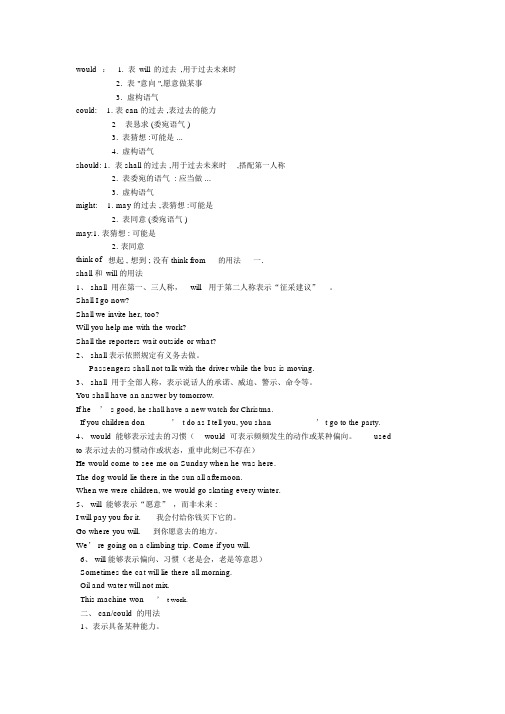
would: 1.表will的过去,用于过去未来时2.表 "意向 ",愿意做某事3.虚构语气could: 1. 表 can 的过去 ,表过去的能力2表恳求 (委宛语气 )3.表猜想 :可能是 ...4.虚构语气should: 1. 表 shall 的过去 ,用于过去未来时,搭配第一人称2.表委宛的语气 : 应当做 ...3.虚构语气might: 1. may 的过去 ,表猜想 :可能是2.表同意 (委宛语气 )may:1. 表猜想 : 可能是think of shall 和2. 表同意想起 , 想到 ; 没有 think fromwill 的用法的用法一.1、 shall 用在第一、三人称,will用于第二人称表示“征采建议”。
Shall I go now?Shall we invite her, too?Will you help me with the work?Shall the reporters wait outside or what?2、 shall 表示依照规定有义务去做。
Passengers shall not talk with the driver while the bus is moving.3、 shall 用于全部人称,表示说话人的承诺、威迫、警示、命令等。
You shall have an answer by tomorrow.If he’ s good, he shall have a new watch for Christma.If you children don’ t do as I tell you, you shan’ t go to the party. 4、 would 能够表示过去的习惯(would 可表示频频发生的动作或某种偏向。
used to 表示过去的习惯动作或状态,重申此刻已不存在)He would come to see me on Sunday when he was here.The dog would lie there in the sun all afternoon.When we were children, we would go skating every winter.5、 will 能够表示“愿意” ,而非未来 :I will pay you for it.我会付给你钱买下它的。
【英语】情态动词练习题含答案及解析
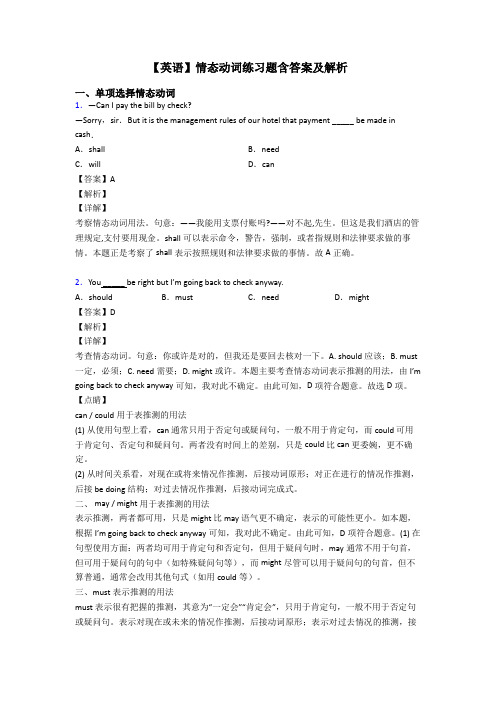
【英语】情态动词练习题含答案及解析一、单项选择情态动词1.—Can I pay the bill by check?—Sorry,sir.But it is the management rules of our hotel that payment _____ be made in cash.A.shall B.needC.will D.can【答案】A【解析】【详解】考察情态动词用法。
句意:——我能用支票付账吗?——对不起,先生。
但这是我们酒店的管理规定,支付要用现金。
shall可以表示命令,警告,强制,或者指规则和法律要求做的事情。
本题正是考察了shall表示按照规则和法律要求做的事情。
故A正确。
2.You _____ be right but I’m going back to check anyway.A.should B.must C.need D.might【答案】D【解析】【详解】考查情态动词。
句意:你或许是对的,但我还是要回去核对一下。
A. should应该;B. must 一定,必须;C. need需要;D. might或许。
本题主要考查情态动词表示推测的用法,由I’m going back to check anyway可知,我对此不确定。
由此可知,D项符合题意。
故选D项。
【点睛】can / could用于表推测的用法(1) 从使用句型上看,can 通常只用于否定句或疑问句,一般不用于肯定句,而could 可用于肯定句、否定句和疑问句。
两者没有时间上的差别,只是could 比 can 更委婉,更不确定。
(2) 从时间关系看,对现在或将来情况作推测,后接动词原形;对正在进行的情况作推测,后接 be doing 结构;对过去情况作推测,后接动词完成式。
二、 may / might用于表推测的用法表示推测,两者都可用,只是 might 比 may 语气更不确定,表示的可能性更小。
情态动词的用法及练习(附答案)

情态动词的用法及专项练习第1 & 2类:词形词的含义例句can ①“能力”②“允许”③“可能性”(0%)④“请求”I can speak English.Can I go to the toilet.It can’t be Susan. She is in Paris. Can you help me?could ①“过去的能力”②“过去的允许”③“可能性”(30%)④“请求”, 比can更客气⑤“建议”⑥“将来的一种可能性”She could speak English When she was 5 years old. Could I borrow your dictionary?It could get much colder in January.Could you please say that again more slowly.We could try to fix it ourselves.I think we could go to war again.be able to “能力”= can, 但比can的时态更具多样性。
can无法表达的时态,用be able to表达。
She will be able to teach English. (一般将来时)She was able to talk when she was 2 years old. (一般过去时)I would love to be able to play the piano. (动词不定式)may ①“请求、允许”(比较礼貌)②“将来的可能性”(50%)③may 在更多的时态中经常May I come in?It may rain tomorrow.第1类:十大情态动词can / could / may / might / must / ought to / shall / should / will / would 第2类:半情态词及充当情态动词的词had better / be able to / have to / used to / need / dare用be allowed to来代替might “较小的可能性”(≤30%)I might move to Canada some day.must ①“必须”(责任、义务)②“可能性”(推测) (100%)③“禁止”(否定式) Everyone must pay taxes.She didn’t arrive. She must be sick.You mustn’t p l ay with fire. It’s dangerous.have to ①“必须、不得不”(客观上不得不做)②多种时态里面代替“must”,因must只有一般现在,但have to 可以有多种时态。
情态动词详解、典型例题及模拟试题(含答案)教学文案
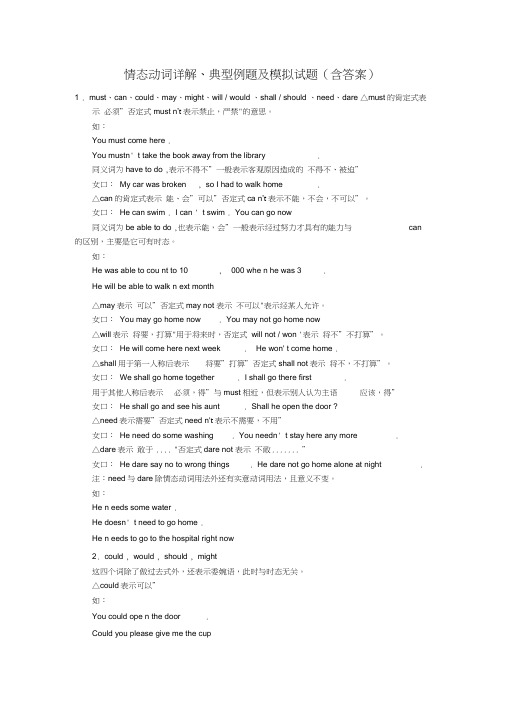
情态动词详解、典型例题及模拟试题(含答案)1 . must、can、could、may、might、will / would 、shall / should 、need、dare △must的肯定式表示必须”否定式must n't表示禁止,严禁"的意思。
如:You must come here .You mustn' t take the book away from the library .同义词为have to do ,表示不得不”一般表示客观原因造成的不得不、被迫”女口:My car was broken , so I had to walk home .△can的肯定式表示能、会”可以”否定式ca n't表示不能,不会,不可以”。
女口:He can swim . I can ' t swim . You can go now同义词为be able to do ,也表示能,会”一般表示经过努力才具有的能力与can 的区别,主要是它可有时态。
如:He was able to cou nt to 10 , 000 whe n he was 3 .He will be able to walk n ext month△may表示可以”否定式may not 表示不可以"表示经某人允许。
女口:You may go home now . You may not go home now△will表示将要,打算"用于将来时,否定式will not / won '表示将不”不打算”。
女口:He will come here next week . He won' t come home .△shall用于第一人称后表示将要”打算”否定式shall not表示将不,不打算”。
女口:We shall go home together . I shall go there first .用于其他人称后表示必须,得”与must相近,但表示别人认为主语应该,得”女口:He shall go and see his aunt . Shall he open the door ?△need表示需要”否定式need n't表示不需要,不用”女口:He need do some washing . You needn' t stay here any more .△dare表示敢于.... "否定式dare not 表示不敢....... ”女口:He dare say no to wrong things . He dare not go home alone at night .注:need与dare除情态动词用法外还有实意动词用法,且意义不变。
【英语】高考英语易错题专题三情态动词(含解析)
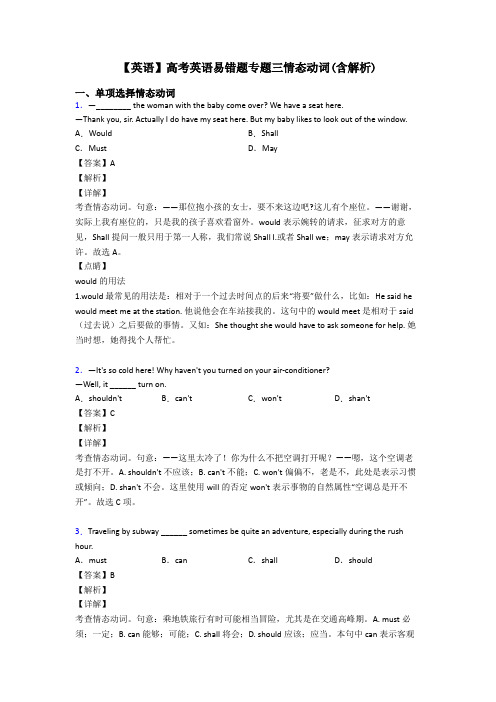
C.won'tD.shouldn't
【答案】D
【解析】
【详解】
考查情态动词。句意:我们不应该把拥有洁净的饮用水看作是理所当然的。也许有一天,我们会用完它。shouldn't“不应该”,符合句意。needn't不必;can't不可能;won't将不。故选D。
9.It_____ have been Tom that parked the car here, as he is the only one with a car.
12.One of our rules is that every student _______ wear school uniform while at school.
A.mightB.could
C.shallD.will
【答案】C
【解析】
【详解】
考查情态动词辨析。句意:我们其中一条规则要求每个学生在校期间都要穿校服。shall可以表示“命令,警告,强制要求;允诺;法律,规定要做……”,结合句意可知C正确。
I guess the poet would have been about twenty when she wrote her first poem.
13.It has been announced that all the candidates ___________ remain in their seats until all the papers have been collected.
A.shallB.could
C.wouldD.ought
【点睛】
would的用法
英语情态动词用法详解
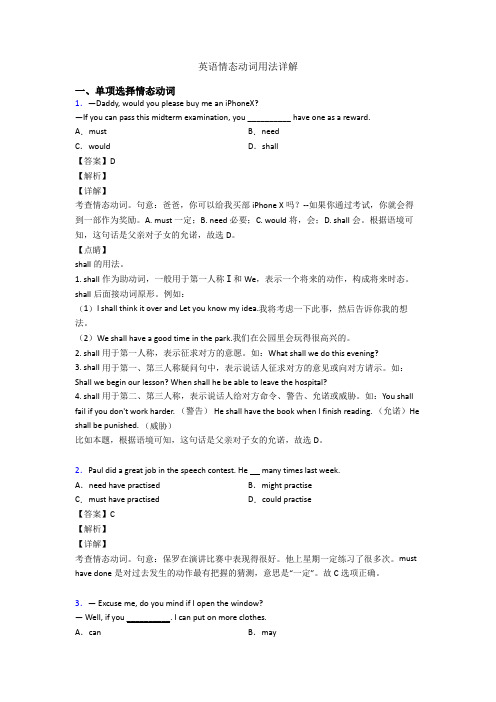
英语情态动词用法详解一、单项选择情态动词1.—Daddy, would you please buy me an iPhoneX?—If you can pass this midterm examination, you __________ have one as a reward.A.must B.needC.would D.shall【答案】D【解析】【详解】考查情态动词。
句意:爸爸,你可以给我买部iPhone X吗?--如果你通过考试,你就会得到一部作为奖励。
A. must一定;B. need必要;C. would将,会;D. shall会。
根据语境可知,这句话是父亲对子女的允诺,故选D。
【点睛】shall的用法。
1. shall作为助动词,一般用于第一人称Ⅰ和We,表示一个将来的动作,构成将来时态。
shall后面接动词原形。
例如:(1)I shall think it over and Let you know my idea.我将考虑一下此事,然后告诉你我的想法。
(2)We shall have a good time in the park.我们在公园里会玩得很高兴的。
2. shall用于第一人称,表示征求对方的意愿。
如:What shall we do this evening?3. shall用于第一、第三人称疑问句中,表示说话人征求对方的意见或向对方请示。
如:Shall we begin our lesson? When shall he be able to leave the hospital?4. shall用于第二、第三人称,表示说话人给对方命令、警告、允诺或威胁。
如:You shall fail if you don't work harder. (警告) He shall have the book when I finish reading. (允诺)He shall be punished. (威胁)比如本题,根据语境可知,这句话是父亲对子女的允诺,故选D。
初一情态动词讲解及练习附答案

(could), may (might), must, have to, shall (should, will (would), dare (dared), need (needed), ought to等。
情态动词无人称和数的变化;不能单独使用,必须与其后的动词原形构成谓语一、can, could1) 表示能力(体力、知识、技能)。
Can you lift this heavy box?(体力)Mary can speak three languages.(知识)Can you skate?(技能)此时可用be able to代替。
Can只有一般现在时和一般过去式;而be able to则有更多的时态。
I’ll not be able to come this afternoon.当表示“经过努力才得以做成功某事”时应用be able to,不能用Can。
如:He was able to go to the party yesterday evening in spite of the heavy rain.2) 表示请求和允许。
-----Can I go now? ----- Yes, you can. / No, you can’t. 此时可与may互换。
在疑问句中还可用could, might代替,不是过去式,只是语气更委婉,不能用于肯定句和答语中。
---- Could I come to see you tomorrow? ---- Yes, you can. ( No, I’m afraid not. )3) 表示客观可能性(客观原因形成的能力)。
They’ve changed the timetable, so we can go by bus instead. This hall can hold 500 people at least.4) 表示推测(惊讶、怀疑、不相信的态度),用于疑问句、否定句和感叹句中。
- 1、下载文档前请自行甄别文档内容的完整性,平台不提供额外的编辑、内容补充、找答案等附加服务。
- 2、"仅部分预览"的文档,不可在线预览部分如存在完整性等问题,可反馈申请退款(可完整预览的文档不适用该条件!)。
- 3、如文档侵犯您的权益,请联系客服反馈,我们会尽快为您处理(人工客服工作时间:9:00-18:30)。
情态动词shall/would/may
1. Excuse me. ______ you please pass me that cup?
A. Do
B. Should
C. Would
D. Must
参考答案:C
本题考查would的用法。
“表委婉地提出请求、建议或看法”应该用情态动词would,该句的意思是“请你递给我那个杯子”,should意思是“应该”,must 意思是“必须”,均不符合句意,故正确答案为C。
2. 用括号中所给单词的适当形式完成句子。
Would you ______ cleaning the window? (mind)
参考答案:mind
情态动词would后面要用动词原形,故该空应填mind。
3. ______ you like to have another try?
A. Could
B. Will
C. Would
D. Do
参考答案:C
“表委婉地提出请求、建议或看法”并且与like搭配的应该用would,故正确答案为C。
4. ______ I have a word with the teacher, sir?
A. May
B. Would
C. Will
D. Should
参考答案:A
本题考查may的用法。
may表示许可或征求对方的许可,意思是“可以”,will 意思是“将要”,would意思是“愿意”,should意思是“应该”,而句意是“先生,我可以和这位老师说几句吗”,故正确答案为A。
5. - May I talk about it with anyone I like?
- No, you ______ .
A. shouldn’t
B. mustn’t
C. needn’t
D. don’t have to
参考答案:B
回答may开头的疑问句,否定回答的结构有“No, you can’t”、“No, you mustn’t”、“No, you’d better not”,故该题正确答案为B。
6. - ______ I visit Lucy on Sunday, Mum?
- Yes, you ______ .
A. Must; can
B. Need; need
C. May; may
D. May; need
参考答案:C
问句的意思是“妈妈,我周日可以去拜访Lucy吗”,因此应该用may,回答may 开头的疑问句,肯定回答结构应该用yes, you may,故该题正确答案为C。
7. - May I go now?
- No, you ______ . You ______ stay here.
A. needn’t; have to
B. nee dn’t; must
C. mustn’t; has to
D. mustn’t; have to
参考答案:D
may开头的疑问句否定回答是用mustn’t,因此先排除A、B,又因主语是you,应该用have to,故该题正确答案为D。
8. She ______ not know about it.
A. will
B. would
C. may
D. should
参考答案:C
本题考查may的用法。
may可以表示“猜测”,通常只用于陈述句中,该句的意思是“她可能不知道这事”,故该题正确答案为C。
9. - What is your mother going to do this Saturday?
- I’m not sure. She ______ go to see my grandmother.
A. can
B. must
C. may
D. need
参考答案:C
根据句意I am not sure可得知“她可能去看我奶奶”,是表示推测,并且不是很确定的推测,因此应该用may,而can和must也表示推测,但是是比较肯定的推测,故该题正确答案为C。
10. You ______ take whatever you like.
A. may
B. would
C. will
D. should
参考答案:A
本题考查may的用法。
may可以表示“允许”,该句话的意思是“无论你喜欢什么你都可以拿走”,故该题正确答案为A。
11. - The room is so dirty. ______ we clean it?
- Of course.
A. Will
B. Shall
C. Would
D. Do
参考答案:B
本题考查shall的用法。
shall常用于第一人称表示“征求对方的意见”,该句的意思是“房间太脏了,我们打扫一下,好吗”,故该题正确答案为B。
12. - Shall I get one more cake for you, Dad?
- Thanks, but you ______ , I’ve had enough.
A. may not
B. must not
C. can’t
D. needn’t
参考答案:D
may not表达不太肯定的推测,must not意思是“决不能”,can’t意思是“不能”,needn’t意思是“不必,不需要”,该句意思应该是“谢谢,但是不必了,我已经吃饱了”,故该题正确答案为D。
